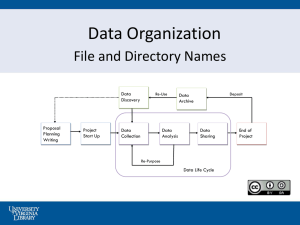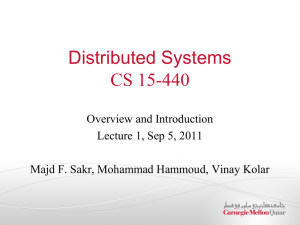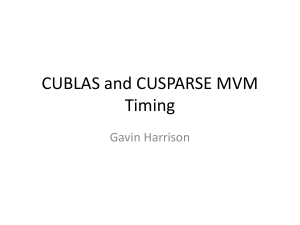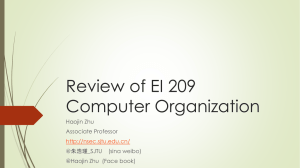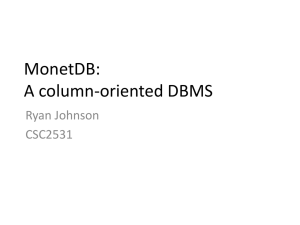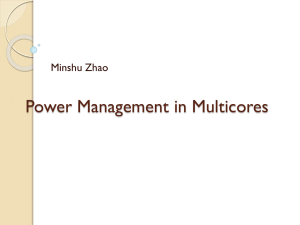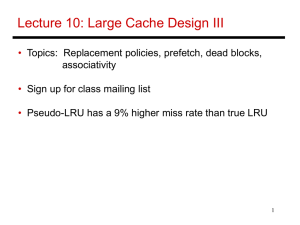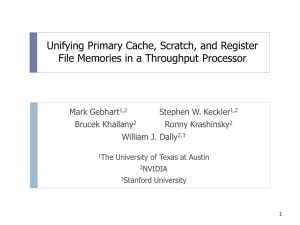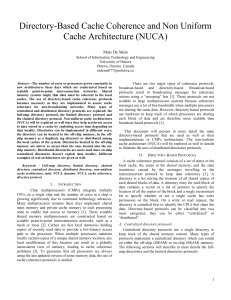Directory-Based Cache Coherence
advertisement
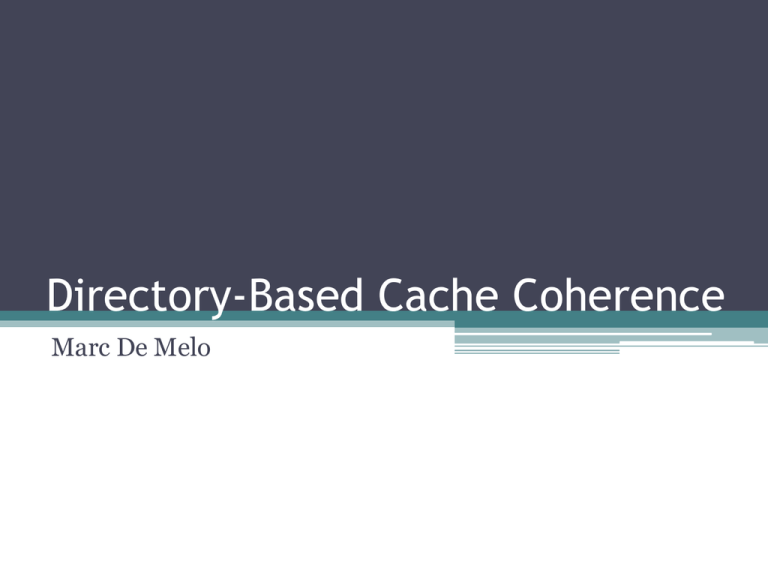
Directory-Based Cache Coherence Marc De Melo 2 Outline • Non-Uniform Cache Architecture (NUCA) • Cache Coherence • Implementation of directories in multicore architecture 3 Non-Uniform Cache Architecture [1] • Uniform Cache Architecture ▫ Multi-level cache hierarchies Organized into a few discrete levels Each level reduces access to the lower level Inclusion overhead Internal wire delays Restricted number of ports ▫ Large on-chip cache Single and discrete hit latency Undesirable due to increasing wire delays 4 Non-Uniform Cache Architecture [1] • Non-uniform cache architecture (NUCA) ▫ Exploit non-uniformity Data in large cache closer to processor is accessed faster than data residing physically farther Level 2 caches architectures, 16MB with 50nm technology (taken from [1]) 5 Non-Uniform Cache Architecture [1] • Static NUCA ▫ Each bank can be accessed at different speeds Proportional to the distance from the controller Lower latency when closer to controller ▫ Mapping of data into banks based on block index ▫ Banks are independently addressable ▫ Access to banks may proceed in parallel Banks have private channels ▫ Large number of wires ▫ Access time and routing delay increase with time Best organization at smaller technologies uses larger banks 6 Non-Uniform Cache Architecture [1] Static NUCA design (taken from [1]) 7 Non-Uniform Cache Architecture [1] • Switched Static NUCA ▫ 2D Mesh, point-to-point links ▫ Removes most of the large number of wires ▫ Allows a large number of faster, smaller banks • Dynamic NUCA ▫ Allows data to be mapped to many banks ▫ Allows data to migrate among the banks ▫ Frequently used data can be promoted to faster banks 8 Non-Uniform Cache Architecture [1] Switched NUCA design (taken from [1]) 9 Non-Uniform Cache Architecture [2] • Policies ▫ Bank placement policy Where is data placed in the NUCA cache memory ▫ Bank access policy Determines bank-searching algorithm ▫ Bank migration policy Determines if a data element is allowed to change its placement from one bank to another Regulates migration of data ▫ Bank replacement policy How NUCA behaves when there is a data eviction from one of the banks 10 Non-Uniform Cache Architecture [2] Taken from [2] 11 Cache Coherence • Cache-coherence problem • Support for large number of processors ▫ Need for high bandwidth ▫ Bus architecture insufficient • Point-to-Point networks ▫ No broadcast mechanism ▫ Snooping protocol unusable • Directory ▫ Solution for point-to-point networks ▫ Stores location of cache copies of blocks of data ▫ Centralized or distributed 12 Implementation of directories in multicore architectures [3] • DRAM (off-chip) directory ▫ Stores directory information in DRAM Ex: full-map protocol ▫ Does not exploit distance locality ▫ Treats each tile as a potential sharer of data ▫ Directory can be cached in on-chip SRAM Do not need to access off-chip memory each time 13 Implementation of directories in multicore architectures [3] Taken from [3] 14 Implementation of directories in multicore architecture [4] • DRAM (off-chip) directory with directory caches ▫ Private cache ▫ Directory is cached in each tile Do not need to access off-chip memory each time Non-coherent caches Home node for any given cache line Different range of memory address for each tile ▫ Directory controller in each tile Controls coherency between private caches 15 Implementation of directories in multicore architecture [4] Taken from [4] 16 Implementation of directories in multicore architectures [3] • Duplicate tag directory ▫ Directory centrally located in SRAM ▫ Connected to individual cores ▫ Exact duplicate tag store Directory state for a block is determined by examining copy of tags of every possible cache that can hold the block Keep copied tags up-to-date ▫ No more need to read states from DRAM memory ▫ Challenging as the number of cores increases 64 cores, 16-way associative cache = 1024 aggregate associativity of all tiles 17 Implementation of directories in multicore architectures [3] Taken from [3] 18 Implementation of directories in multicore architecture [5] Directory memory, 4-way associative caches (taken from [5]) 19 Implementation of directories in multicore architectures [3] • Static cache bank directory ▫ Distributed directory among the tiles Mapping block address to a tile (called the home tile) Home tiles selected by simple interleaving Location can be sub-optimal (see next slide) Tile’s cache extended to contain directory information Integrates directory states with cache tags Avoids SRAM or DRAM separate directory 20 Implementation of directories in multicore architectures [3,6] Taken from [6] Taken from [3] 21 Implementation of directories in multicore architecture [7] • SGI Origin2000 multiprocessor system ▫ Directory memory connected to on-chip memory Shared L2 cache Directory memory distributed over multiple tiles Cache coherence controller Home tile sends appropriate messages to cores 22 Implementation of directories in multicore architecture [7] SGI Origin2000 multiprocessor system (taken from [7]) 23 Implementation of directories in multicore architecture [8] • Tilera Tile64 architecture ▫ 2d mesh network (8X8) ▫ Provides coherent shared-memory environment ▫ Uses neighborhood caching Provides on-chip distributed shared cache ▫ Coherency is maintained at the home tile Data is not cached at non-home tiles ▫ Communication over a Tile Dynamic Network 24 Implementation of directories in multicore architecture [9] Tilera Tile64 (taken from) 25 References • [1] C. Kim, D. Burger, S.W. Keckler, “An Adaptative, Non-Uniform Cache Structure for Wire-Delay Dominated On-Chip Caches”, in Proc. 10th Int. Conf. ASPLOS, San Jose, CA, 2002, pp. 1-12 • [2] J. Lira, C. Molina, A. Gonzalez, “Analysis of Non-Uniform Cache Architecture Policies for Chip-Multiprocessors Using the Parsec Benchmark Suite”, MMCS’09, Mar. 2009, pp. 1-8 • [3] M.R. Marty, M.D. Hill, “Virtual Hierarchies to Support Server Consolidation”, ISCA’07, June 2007, pp. 1-11 • [4] J.A. Brown, R. Kumar, D. Tullsen, “Proximity-Aware Directory-based Coherence for Multi-core Processor Architectures”, SPAA’07, June 2007, pp. 1-9 • [5] J. Chang, G.S. Sophi, “Cooperative Caching for Chip Multiprocessors”, Computer Architecture, ISCA '06. 33rd International Symposium on, 2006, pp.264-276 • [6] S. Cho, L. Jin, "Managing Distributed, Shared L2 Caches through OS-Level Page Allocation“, Microarchitecture, 2006. MICRO-39. 39th Annual IEEE/ACM International Symposium on, Dec. 2006, pp.455-468 • [7] H. Lee, S. Cho, B.R. Childers, "PERFECTORY: A Fault-Tolerant Directory Memory Architecture“, Computers, IEEE Transactions on , vol.59, no.5, May 2010, p.638-650 • [8] D. Wentzlaff, P. Griffin, H. Hoffmann, L. Bao, B. Edwards, C. Ramey, M. Mattina, C.C. Miao, J.F. Brown, A. Agarwal, "On-Chip Interconnection Architecture of the Tile Processor“, Micro, IEEE , vol.27, no.5, Sept.-Oct. 2007, pp.15-31 • [9] Linux Devices, “4-way chip gains Linux IDE, dev cards, design wins” [online], Linux Devices, Apr. 2008 [cited Oct. 21 2010] , available from World Wide Web: < http://thing1.linuxdevices.com/news/NS4811855366.html >
